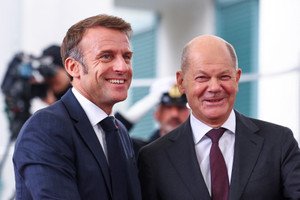French and German leaders to meet under cloud of Trump tariff threats
Published by Global Banking & Finance Review®
Posted on January 22, 2025
2 min readLast updated: January 27, 2026

Published by Global Banking & Finance Review®
Posted on January 22, 2025
2 min readLast updated: January 27, 2026

Macron and Scholz meet in Paris to address Trump's tariff threats, focusing on EU trade and economic issues amid political challenges.
By Dominique Vidalon and Elizabeth Pineau
PARIS (Reuters) - French President Emmanuel Macron and German Chancellor Olaf Scholz were set to meet in Paris on Wednesday to discuss Ukraine and economic issues, as Europe struggles to respond with one voice to threats of tariffs from U.S. President Donald Trump.
Trump, who has also threatened Canada, Mexico and China with heavy duties, said on Tuesday Europe had troubling trade surpluses with the United States.
"The European Union is very, very bad to us," Trump told reporters at the White House on Tuesday. "So they're going to be in for tariffs. It's the only way ... you're going to get fairness."
Many EU countries have export-oriented economies. Already facing higher energy costs because of the war in Ukraine and a slowdown in trade with China, they do not relish the idea of a new front with the U.S.
But there is little consensus in the EU on how to respond.
"Neither Europe nor the U.S. has an interest in an escalating trade war," French government spokeswoman Sophie Primas told reporters.
"We have entered a new phase of negotiations with the U.S. Relations with President Trump are transactional. We must be as determined as the U.S., we must show our strength."
Both Macron -- who lost snap elections last year and has had four prime ministers in 2024 alone -- and Scholz, who is trailing his conservative rival in polls for the German election next month, are weakened politically at home.
The pair have differed on many issues in recent years slowing down decision-making in the EU and leaving a leadership void that EU institutions have struggled to fill.
"Franco-German relations must warm up very strongly and very quickly," said a French government source, speaking on condition of anonymity. "Europe won't be relaunched without a strong Franco-German couple."
One issue on which they appear to agree is on the agenda for the working lunch at the Elysee Palace: a push to cut red tape and improve competitiveness.
But while leading German politicians are pushing for a free trade agreement between Europe and the U.S., France says the EU must reject economic coercion and apply counter-tariffs if attacked.
(Writing by Michel Rose; Editing by Kevin Liffey)
The meeting between Macron and Scholz to discuss Trump's tariff threats and EU economic issues.
The EU is concerned about trade surpluses with the US and potential tariffs impacting export-oriented economies.
France and Germany are focusing on cutting red tape and improving competitiveness, with differing views on a US-EU trade agreement.
Explore more articles in the Finance category
